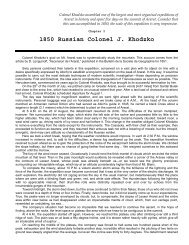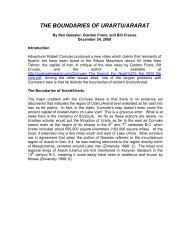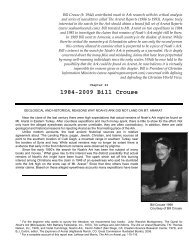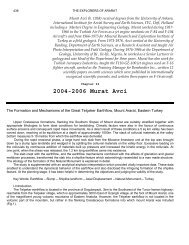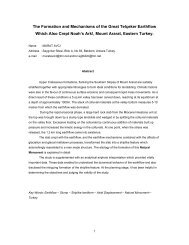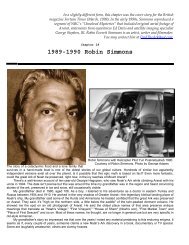1876 British Viscount & Ambassador James Bryce - Noah's Ark Search
1876 British Viscount & Ambassador James Bryce - Noah's Ark Search
1876 British Viscount & Ambassador James Bryce - Noah's Ark Search
You also want an ePaper? Increase the reach of your titles
YUMPU automatically turns print PDFs into web optimized ePapers that Google loves.
138 THE EXPLORERS OF ARARAT<br />
much upon them and bread. If I were asked to characterize the most conspicuous externals of Russia in three words,<br />
they should be “sheepskins, cucumbers, emeralds.” 1<br />
Buoys are anchored in many dangerous spots, landmarks are placed along the shore, and at night colored lights<br />
are shown. Although our steamer drew only four feet of water there were so many shoals and sandbanks about, that,<br />
instead of holding an even course down the middle of the stream, she was perpetually darting across it from the one<br />
shore to the other, so as to keep in the deepest part of the channel. Whenever one of the shallower parts was reached<br />
a bell was rung, which brought some of the crew forward, and one of them took his place armed with a long pole, the<br />
lower part of which was marked in colors, just like the “stick” in croquet, each foot’s length having a different color.<br />
This pole he nimbly plunged into the water just before the bow, till it touched the bottom, and then seeing by the marks<br />
on it what the depth was, he sang out, “vosem,” “sem,” “shest” (eight, seven, six), as the case might be, the vessel still<br />
advancing. As the smaller numbers began to be reached, a slight thrill ran through the group that watched, and when<br />
“piat” (five) followed, the engines were slowed or stopped in a moment, and we glided softly along over the shoal till<br />
“sem,” “vosem,” “deviat” (nine), following in succession, told that the risk of grounding was for the moment past.<br />
The Tatars of Kazan [different Kazan than the village Kazan next to Mount Ararat], who are no doubt Turks, retain<br />
not only their language and their religion but their social usages; they rarely or never intermarry with the Russians, but<br />
otherwise live on good enough terms with them, and do not seem to complain of the Christian government, which has<br />
been wise enough not to meddle with their faith. Since the fall of their Khanate three hundred years ago, they have<br />
rarely given any trouble, and now serve in the army like other subjects of the Czar. They are usually strong men, lithe<br />
and sinewy, of a make more spare than that of the Russians, and do most of the hard work both here, in their own<br />
country, and at Nijni and other trading spots along the river. In their faces is seen a good deal of that grave fixity which<br />
gives a dignity even to the humblest Oriental, and contrasts so markedly with the mobile features of the Slav.<br />
Archaeology, except perhaps as a branch of hagiology, or in the leaned circles of St. Petersburg and Moscow,<br />
has scarcely begun to exist in Russia; it is one of the latest births of time everywhere, and, as one may see from the<br />
fate of so many of our own pre-historic monuments, does not commend itself to the practical mind of the agriculturist.<br />
The only countries in which the traveler finds the common people knowing and revering the monuments and legends<br />
of their remote past are Norway and Iceland, where the sagas read aloud in the long nights of winter from manuscripts<br />
preserved in lonely farm-houses, have through many generations fired the imagination and ennobled the life of the<br />
peasant, who knew no other literature and history than that of his own ancestors.<br />
Just as the easternmost point of the bend the river turns south, breaking through the Jigoulef ridge which has<br />
bordered it for twenty miles, and here, at the town of Samara, one seems suddenly to pass, as if through a gate in the<br />
hills, from Europe into Asia. Up to this point all has been green, moist, fresh-looking, the air soft though brilliantly clear,<br />
the grass not less juicy than in England, the wayside flowers and trees very similar to our own, if not always of the<br />
same species. But once through the hills, and looking away southeast across the boundless steppe towards Orenburg<br />
and the Ural River, a different climate and scenery reveal themselves. The air is hot and dry, the parched earth gapes<br />
under the sun, the hills are bare, or clothed only with withered weeds; plants and shrubs of unfamiliar aspect appear,<br />
the whole landscape has a tawny torrid look, as if of an African desert. Henceforth, all the way to the Black Sea, one<br />
felt one’s self in the glowing East, and seemed at a glance to realize the character of the wilderness that stretches from<br />
here all the way, a plain with scarcely a mound to break its monotony, to the banks of the Oxus and the foot of the<br />
Thian Shan mountains.<br />
By this time nearly all the cabin passengers had done, but the lower deck was still crowded with Armenians and<br />
Persians bound for Astrakhan, whence they were to proceed, by another steamer of the same company, across the<br />
Caspian to Baku in Transcaucasia, or to Lenkoran on the frontiers of Persia. Travelers are fond of talking of the<br />
Oriental character of Russia; and though the smart saying about scratching Russians and finding Tatars is pretty well<br />
exploded (nobody can be essentially less like a Tatar than the Russian is), there are, no doubt, certain points, mostly<br />
mere externals, in which Russian towns, or Russian usages, recall those of the East. What is far more curious is to find<br />
1 The profusion of fine gems, especially emeralds, rubies, and sapphires, you are shown in geological and<br />
antiquarian collections, sewn on to sacerdotal vestments, stuck on to the gold plates with which the sacred pictures are<br />
overlaid, is extraordinary.



